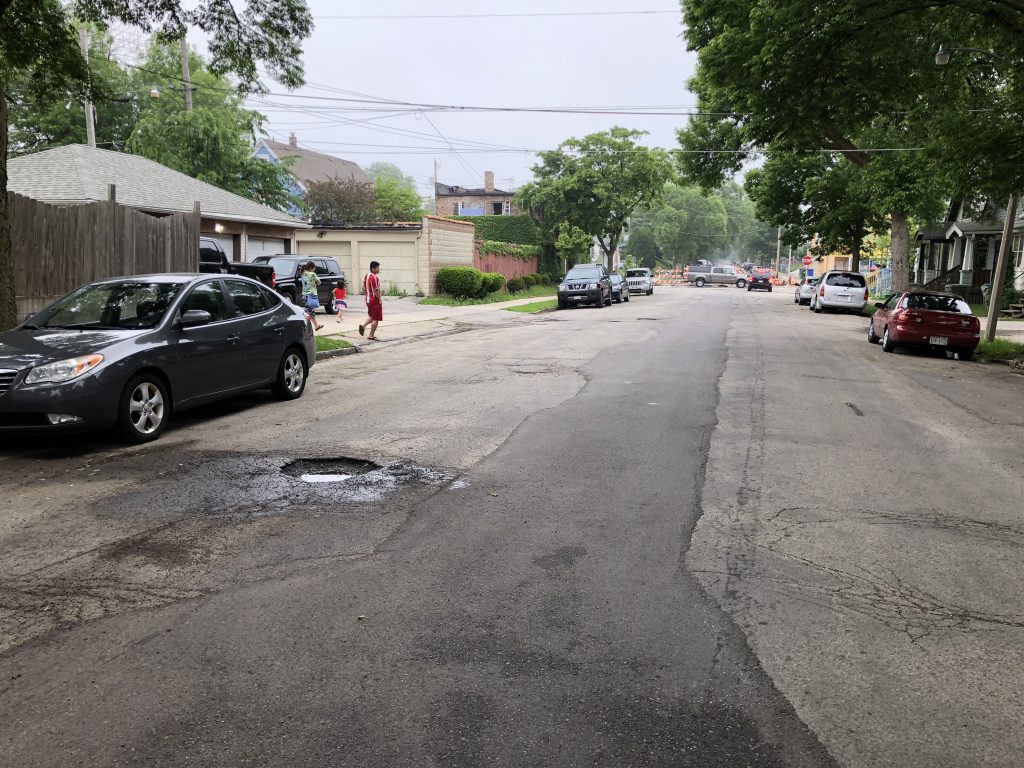Delivery Tax Could Help Fix Potholes
Ald. Dodd's proposal imposes 60 cent fee on third-party deliveries like Uber Eats.
Do you use Uber Eats, DoorDash, GrubHub, Eat Street, Postmates or another third-party delivery service? The cost could be going up.
Under a proposal from Alderwoman Nikiya Dodd, the cost of those deliveries could rise 60 cents per order with the money going to fund both street maintenance (such as filling potholes) and public transportation in Milwaukee.
The proposal targets a fast-growing market segment where companies such as Uber and Madison-based Eat Street hire drivers as independent contractors to make deliveries for third-party restaurants. Participating restaurants range from national chains like McDonalds and Denny’s to local establishments such as The Knick and Shah Jee’s.
“The purpose of this section is to provide the Department of Public Works sufficient resources to maintain public streets and to reduce added wear and tear on public streets arising from the proliferation of on-demand food delivery services,” reads Dodd’s legislation. The proposal will have its first public review before the Common Council’s Public Works Committee on Wednesday.
The online food delivery market was estimated to generate $82 billion in gross revenue in 2018 by research firm Frost & Sullivan. And the market is growing quickly. Frost & Sullivan expects it to hit $200 billion by 2025. Case in point: publicly-traded Uber reported that Uber Eats accounted for 3 percent of its revenue in 2016 and 13 percent in 2018.
A tax on food delivery networks, which the city could implement without needing state approval, appears likely to generate a growing source of revenue. It also appears to be the first such proposal in the country.
Milwaukee’s inability to levy its own sales tax or many other fees without the approval of the state likely makes a delivery tax all the more appealing.
The proceeds could not be used for The Hop, Milwaukee’s streetcar system. The legislation would enable the funds to be used for “street maintenance and to supplement non-rail-based public transportation within the city.” The phrase “rail-based” would thereby exclude all public transportation operated by the city as Milwaukee County owns and operates the bus system.
Does Dodd intend for the city to write a check to the county to support the Milwaukee County Transit System? The alderwoman did not respond to a request for comment by the time of publication. She has opposed funding The Hop since first being elected in 2018.
Dodd is the only sponsor listed on the file at the time of publication.
Milwaukee County’s Proposed Tax on Uber and Lyft
Dodd’s proposal is similar to County Supervisor’s Sylvia Ortiz-Velez‘s proposal to impose a 50 cent fee on all transportation network company (Uber, Lyft, etc, etc) rides. But the supervisor’s proposal requires a state law change, as counties have less power then cities.
Ortiz-Velez believes her proposal could generate $20 million annually for Milwaukee County. Fifty-five percent of those funds would go towards expanding the transit system. The remaining funds would be distributed to municipalities for road repair and public safety.
The supervisor is also endorsing Dodd’s proposal. “I support City of Milwaukee Alderwomen Nikiya Dodd in introducing legislation to take action right now to fix our potholes, fix our roads and have a strong public transit system!,” wrote Ortiz-Velez on Facebook on Friday. Ortiz-Velez and mayoral candidate, Sen. Lena Taylor, defended the proposal in the comments on the post. The supervisor said the proposal was necessary to address wear and tear on the roads caused by the vehicles and the city and county’s declining state shared revenue payments.
But unlike Dodd’s proposal there is precedent for Ortiz-Velez’s tax. Chicago recently instituted a tax, in part to address growing downtown congestion issues. New York City, Washington D.C. and the state of Rhode Island also impose per-ride taxes.
Legislation Link - Urban Milwaukee members see direct links to legislation mentioned in this article. Join today
If you think stories like this are important, become a member of Urban Milwaukee and help support real, independent journalism. Plus you get some cool added benefits.
More about the Food Delivery Fee
- Transportation: Delivery Tax Isn’t Legal, Says City Attorney - Jeramey Jannene - Jan 8th, 2020
- Transportation: Delivery Tax Could Help Fix Potholes - Jeramey Jannene - Jan 6th, 2020
Read more about Food Delivery Fee here
Transportation
-
County Holding Public Meeting on 30th Street Rail-Trail
 Feb 12th, 2026 by Graham Kilmer
Feb 12th, 2026 by Graham Kilmer
-
Mitchell Air Traffic Dropped 7% in 2025
 Feb 11th, 2026 by Graham Kilmer
Feb 11th, 2026 by Graham Kilmer
-
Court Rules Trump Can’t Block EV Charging Funding, Preserving $62 Million in Wisconsin
 Jan 30th, 2026 by Joe Schulz
Jan 30th, 2026 by Joe Schulz






















I am legitimately curious how this does not require state approval. I mean, bully for Milwaukee if they’re found a way to circumvent it, but I was under the impression anything like this would require their approval.
It’s probably akin to the $3 the County collects from Uber/Lyft for pickups at the airport.
Collecting 60¢/delivery seems more than fair for operating a business that, by its nature, wears down municipal infrastructure.
Right now, most highway “user fee” taxes go to the state and federal governments, not the City. The only exception is the $20 City wheel tax and even that pittance only applies if the delivery vehicle is registered in the City.